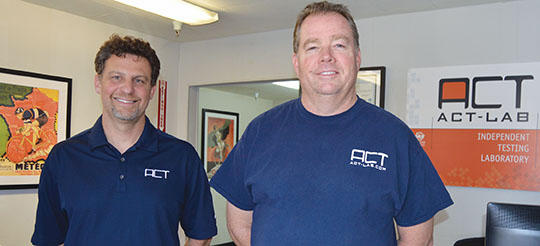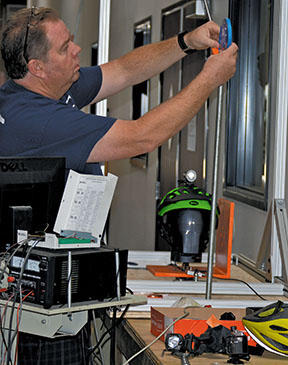The idea had been germinating for some time. Members of the El Segundo-based forensic engineering firm Collision and Injury Dynamics (CID) had been laying plans to create their own testing lab company – after all, CID specializes in vehicle accident reconstruction and biomechanical analysis, so testing things is part and parcel of what it does.
When the federal government mandated new product testing for children’s products, the testing lab company moved from idea to reality. And ACT Lab, an expanding, international company, now calls North Long Beach its home, an ideal location, company officials say, from which to serve a unique, worldwide assembly of clientele.
Goods from manufacturers in the U.S. and across Asia get the stamp of approval from ACT before heading to a showroom or shipping warehouse en route to your home. It is a critical step in international manufacturing, ensuring that companies can do business across the globe, confident in the goods that they are selling.

Pictured at their North Long Beach headquarters are ACT Lab LLC’s Michael Baker, left, global sales & marketing director, and Scott Huber, global operations manager. The company is an “ISO/IEC 17025 independent third-party accredited laboratory conducting consumer product safety and compliance testing,” according to its website. The firm has three offices in China and is opening one in soon in Taichung, Taiwan. (Photograph by the Business Journal’s Larry Duncan)
The Long Beach warehouse and testing facility looks, to the casual observer, like a manufacturing plant gone parallel-universe sideways. Motorcycle helmets are lined up next to a variety of faceless head forms, with a very pointy weight poised high up near the raised ceiling, ready to smash into the helmet to test the protective device’s structural integrity. Bicycle tires are mounted to what is, for lack of a better term, a tire treadmill, and will spin there for days. In one lab, a technician methodically scratches paint from a bicycle part to check the chemical composition of the coating.
But there is method – very rigorously controlled method – to the proceedings. At stake is the safety of a wide variety of products and the wide variety of people who use them.
ACT evolved from the day-to-day activities of CID, Michael Baker, global sales and marketing director of ACT, told the Business Journal.
“As part of [CID’s forensic engineering services], testing was a natural part of proving or disproving the analysis,” Baker says. “Many of the companies they worked for were bicycle manufacturers, helmet manufacturers, things like that. They kind of had put a plan together back in early 2005 about potentially launching a separate company, a testing lab.”
The impetus to move forward came when President George W. Bush signed the Consumer Product Safety Improvement Act (CPSIA) into law in August of 2008, Baker says.
“When the CPSIA was passed, which mandated third party testing for all children’s products, manufacturers already working with Collision and Injury Dynamics came to them and said, ‘Look, if you’re going to move forward with this company, we think it would be great to have a source that we trust and rely on. Now’s a good time.’” Baker says.
The company performs compliance testing for a wide variety of products. Safety equipment including motorcycle and bicycle helmets, bicycle components and entire bicycles make up a large percentage of the company’s compliance business, Baker says. It’s not an accident – Baker, company President John Bogler and others have extensive backgrounds in the bicycling industry.
But the range of products and activities goes far beyond that.
“We do a lot of ride-on toys, your scooters, your tricycles. We also get calls every day for non-core categories. It might be children’s apparel, toys, arts and crafts supplies. We do teethers, chew toys. There are dimensional tests that we can do here,” Baker says.
“Our primary purpose is validating products for safety compliance, primarily federal. That’s a huge focus. But even if the standard is not mandated, for, say, an adult product, retailers, buyers may be demanding that verification from an independent third party. Big box retailers may demand verification for their own purposes.”
And ACT can perform pure research for manufacturers, as well as verifying internal production processes, he says.
“Manufacturers may send us things way pre-production for us to do load testing, fatigue testing, impact testing, just to confirm what they’re seeing or hearing from their manufacturers if they can’t be there at the site of manufacture,” Baker says. “Even if we’re successful in [testing a product to failure], that’s good for them to know what it took to do that. Published standards are kind of the minimum safety requirements. So many manufacturers might say, test it to 20 percent above that, 30 percent above that, or do this to it after the test.”
Another of the company’s services involves ensuring that the products coming off the manufacturing line a year from now are still meeting the standards that the samples sent today meet.

Scott Huber, global operations manager, testing a product for a client. (Photograph by the Business Journal’s Larry Duncan)
“We’ve tested something that meets all the requirements, and later we’ve gotten another sample that didn’t. What changed, and why? We can help determine that,” Baker says.
While the company has grown from about 10 employees at its start to more than 40 today, it is still a very small, niche-focused player in the testing industry. That provides challenges and strengths, Baker says.
Key among the challenges is that the company has to carefully balance expansion into different areas of expertise with the potential revenues available from those sources – and whether ACT can tap into those revenues. The market is dominated by very large firms. To illustrate: ACT has just announced the opening of a new location in Taiwan. That makes five locations worldwide – three in China, one in Taiwan and one in Long Beach. The next has 1,200 offices worldwide, Baker says.
“In order to do tests, you have to be tested yourself. You have to be accredited. There’s a cost associated with that,” Baker says. “The challenging part is, when we’re going after a new segment, do we get accredited to that segment, or do we determine if there’s a demand before we get accredited? When you’re a smaller firm, that scalability – it’s a challenge. We’ve been pretty cautious in the way we grow.
“We’re much smaller, niche-focused, with very few locations. Competing can be challenging. Where we’ve been able to win, especially in those areas where we have expertise, is customer service. We hear it all the time – they’re happy we explained the results, rather than just mailing a report to them. We jump through hoops to offer great customer service.”
And Long Beach proved to be the location from which ACT could service its employee base and its client base – and occasionally pick up work from the aerospace firms in the region, Baker says. Someone may need a part or product tested, and testing equipment can be flexibly configured . . .
“We have employees who live as far away as Irvine and as far north as Redondo [Beach]. We kind of knew that somewhere in between would be nice. But it was really about finding the right real estate for our needs.
“This place had great availability – a location that was close to the freeways, still close to an airport. We have customers who stay at the hotels right here – it’s worked out.”
